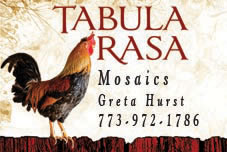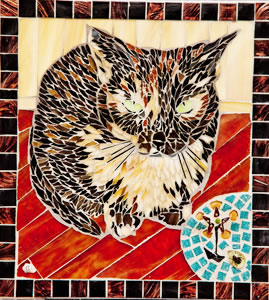 |
Greta Hurst, owner of Tabula Rasa Mosaics, portrays a vision of the natural beauty and chararcter of rural life in and around Baroda, Michigan. Greta's subjects include pastoral landscapes, vineyards, and the earth itself. She strives to convey her passion for the basic elements of “terroir”, a sense of place, the soil and weather to depict the agricultural processes and abundance they produce. In her studio, a converted chicken coop, nestled in the rolling vineyards of Southwest Michigan’s wine country, Greta uses a palette of stained, vitreous, fused and Smalti glass, ceramic tile, porcelain, pebbles, and found objects to create both abstract and representational mosaics. |
|
Hurst has since studied at the Chicago Mosaic School with a variety of teachers to learn innovative techniques to cut and shape glass and realistically incorporate light values into her pieces. She also studied art glass fusing at Water Street Glassworks in Benton Harbor, MI to incorporate that element into her work. Working with many, many small pieces, Greta patiently shapes and assembles them to create a compelling design and view of nature. Creating these mosaic designs is a painstaking process of cutting the glass material and placing the individual pieces, fingernail sized, using a magnified lens and a tweezers. The compulsion to find the perfect piece for each aspect of the design guides her forward. The process is calming and joyful. She has control over this finite universe in making this mosaic art. Why this fascination with minutiae? Everything is a microcosm and worth the time to look at it closely. Every aspect has a purpose and a value. Through membership in the Society of American Mosaic Artists, Hurst first learned of the concept “tabula rasa”, which is Latin for “blank slate,” as represented by a discarded vintage window which she now often uses as the foundation for the mosaic artwork to be built upon and further reflect light. |
 |